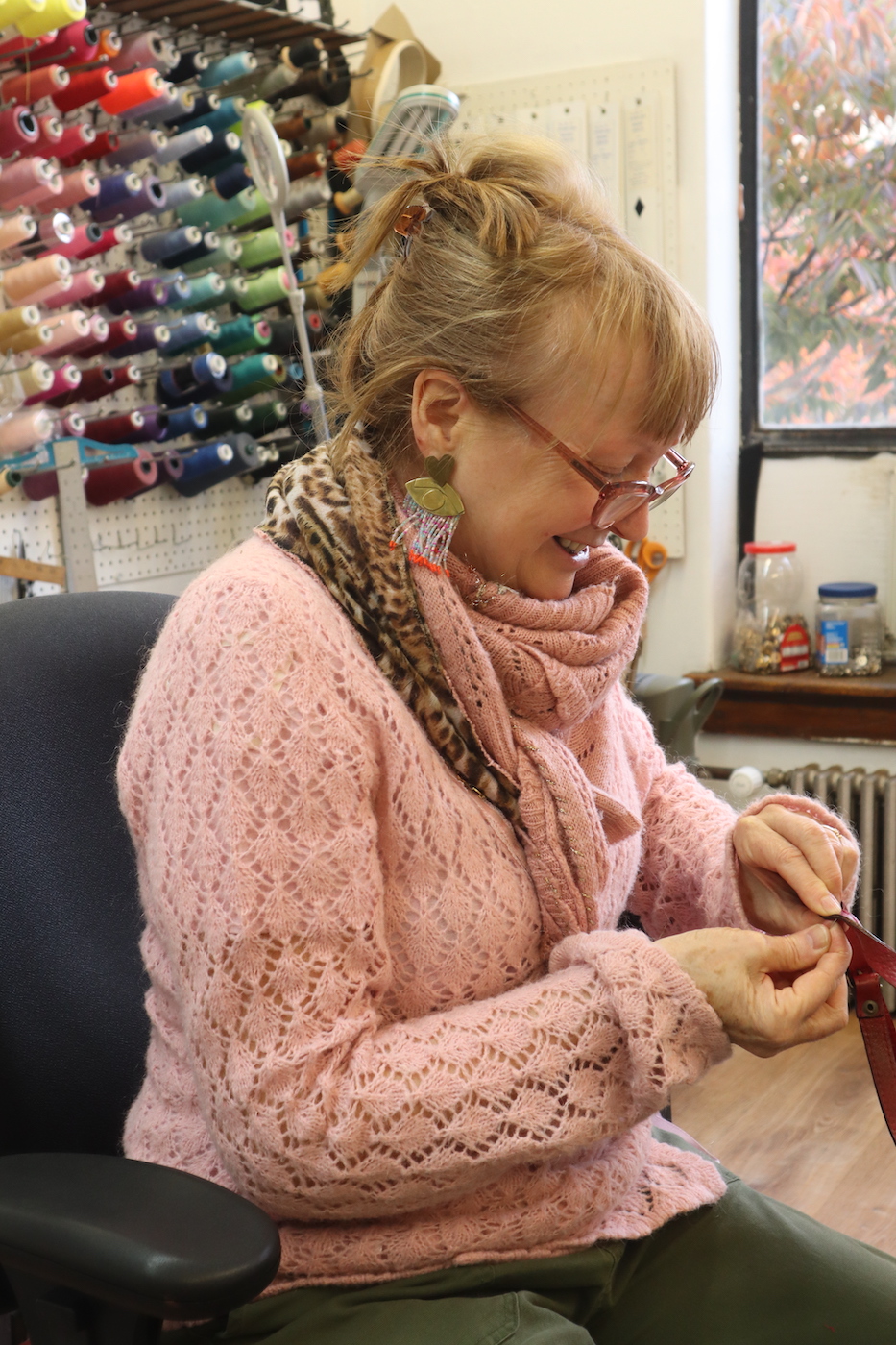
Crafts | Downtown | Arts & Culture | Sewing
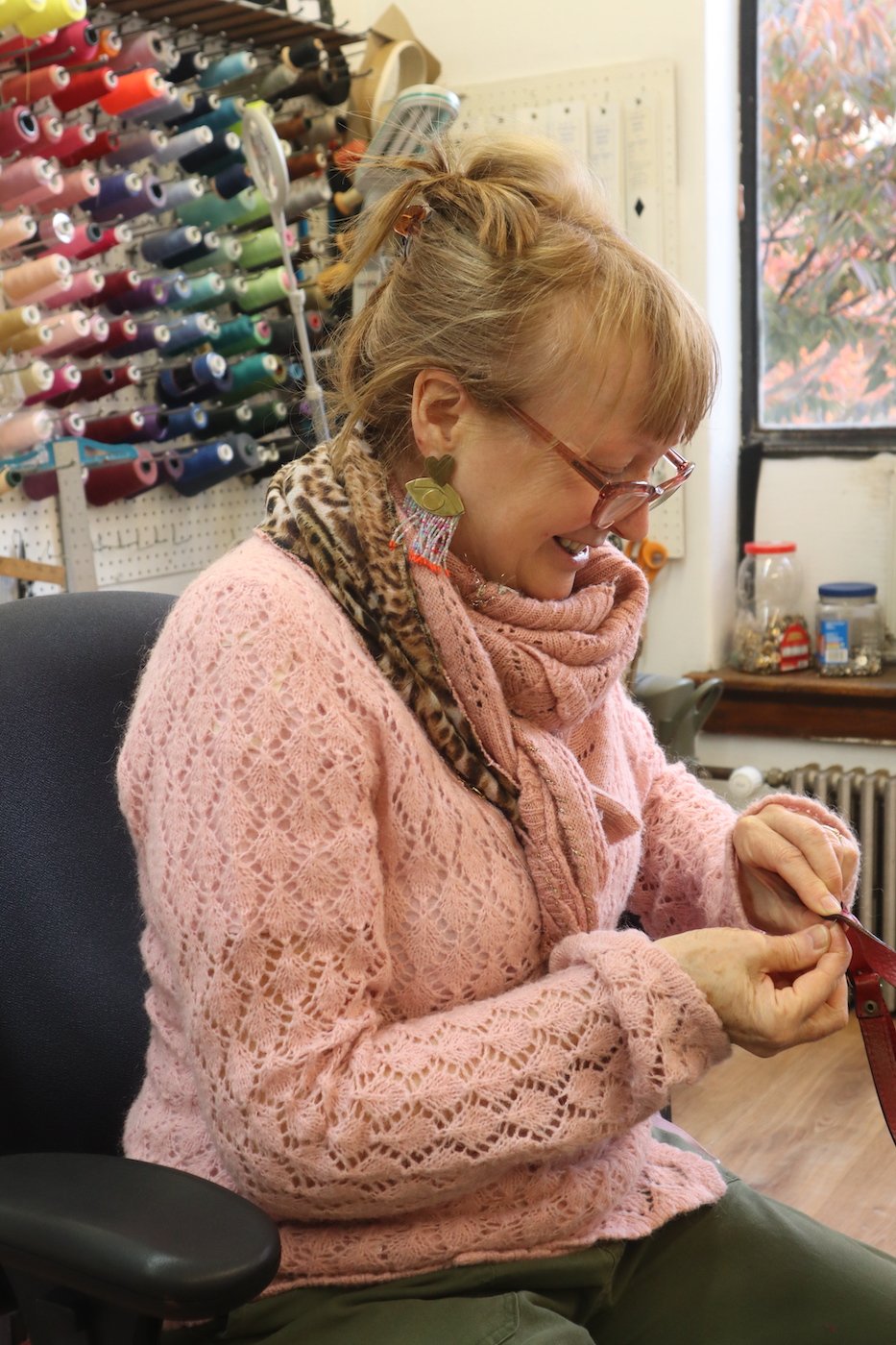
“I created a world that belongs to me and then I invited people in,” said Cazes-Wiley. Olivia Charis Photos.
The afternoon sun set on walls covered in endless rows of thread, the spools organized by color. On the opposite side of the room, light filtered onto an eclectic assortment of fashion items: a bedazzled basketball purse, 20th century hats, and a bright red patchwork sweater.
In the corner near the sewing machines, Catherine Cazes-Wiley’s steady hands guided thread through the seams of a ruby leather purse. She moved effortlessly through the tough leather without a thimble, until she restitched the purse to perfection.
This vibrant, warm world of artistry is Tinaliah Designs & Boutique, a spot that has grown from a station at MakeHaven to a brick-and-mortar storefront downtown. The shop, located on 928 Chapel St. #205, celebrated its official grand opening last month, and is now open for business and sewing lessons Friday and Saturday. Cazes-Wiley, a French fashion designer, sewing instructor and milliner, bought the business last year and turned it into a retail and instructional space.
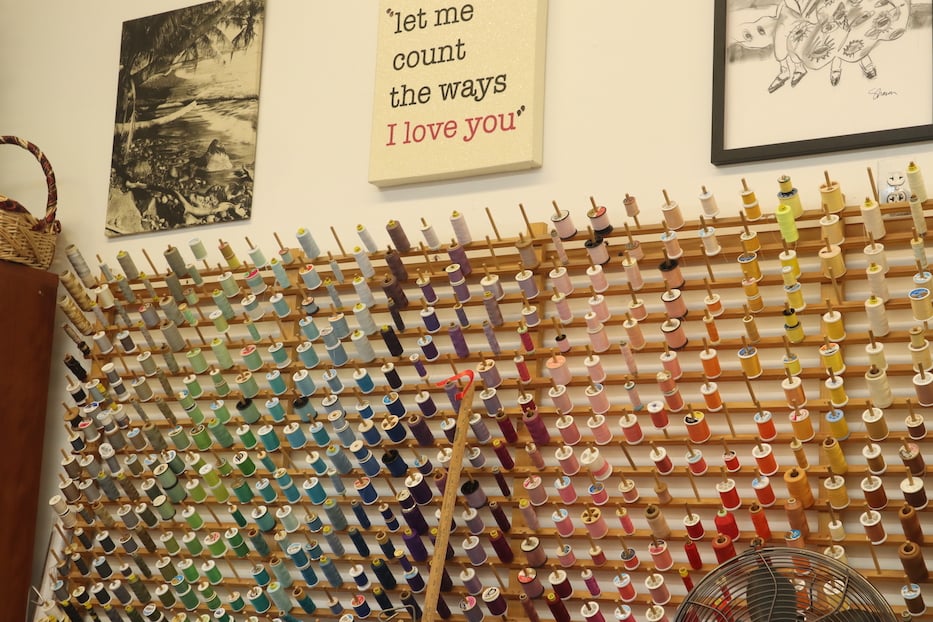
Prior to that, she worked in and for other businesses as director of Tinaliah Co-Op, a design collaborative set to empower artisans pushed to the margins of their craft. The storefront is the designer’s first.
“I didn't fit anywhere so I created my own world,” Cazes-Wiley said last Friday, in an interview at the space. “I created a world that belongs to me and then I invited people in.”
Creating this world was not simple for Cazes-Wiley, she said. Originally born in Montauban, a commune in the South of France, she spent the first few years of her life traveling because of her father’s involvement with the military.
When she was three, her family moved to Africa, before moving once again to Vanuatu, an island in the South Pacific, when she was five. Cazes-Wiley recalled her love of pareo, a traditional wrap cloth she and her family received from the people of Vanuatu as a welcome gift. Even though her mother made all of her clothes at the time, Cazes-Wiley had a fascination for design from an early age.
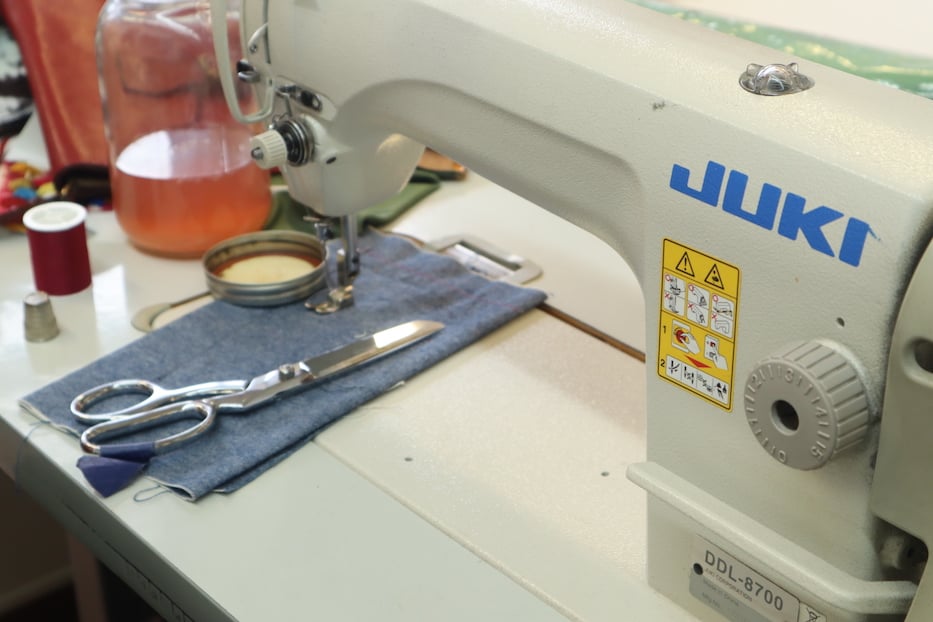
“I think I was five years old. I was making little things for my dolls… little bedsheets and little bloomers, sewing by hand,” she recalled.
It was not until her family returned to France that she began taking official lessons in hand sewing in elementary school. She remembered proudly receiving high marks in her sewing classes. Still, her transition back to France was challenging, she said. Cazes-Wiley dealt with culture shock, feeling out of place in a predominantly white, fast-paced environment.
Her transition to America was equally hard. “It took me a long time to find myself in America,” she said.
Cazes-Wiley originally moved to South Carolina to attend aviation school. After years there, she realized how unsatisfied she was, pursuing dreams that were not her own. After a rough many years, during which she temporarily became homeless, Cazes-Wiley decided to start sewing again.
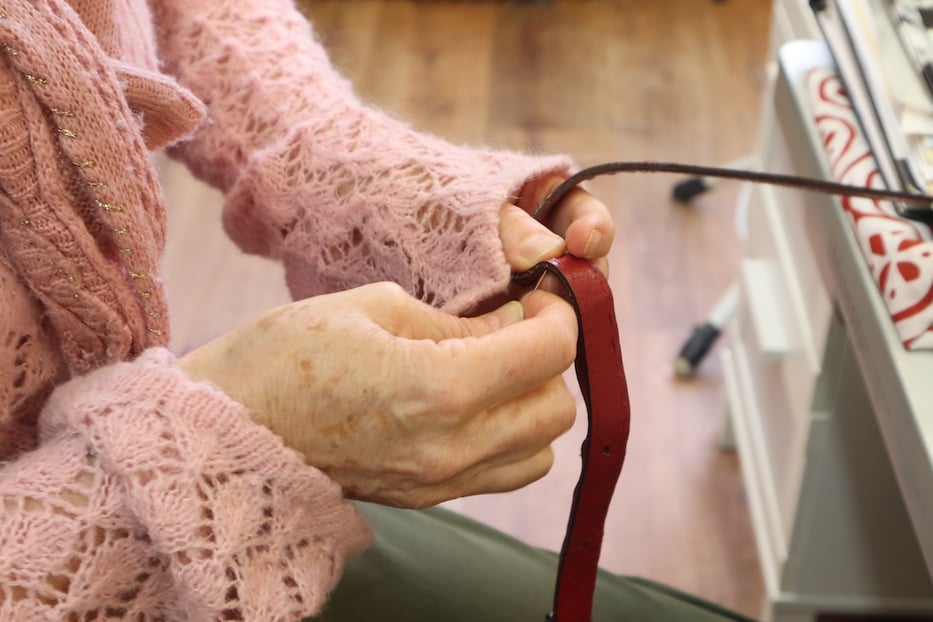
“I got some courage and faith to start again… start fresh … and it was almost in my 30s 40s. I haven’t stopped since,” Cazes-Wiley said.
As she walked around her shop, showing off curated pieces and her own designs, it was clear that Cazes-Wiley’s resilience has paid off.
“I’m approachable. But I’ve got to stand for something in life," she said. "I stand for recycle. I stand for the poor. And I stand for quality—which means it's anti-fashion. Fashion is the second most polluting business in the world. There’s so much garbage. We can make business out of garbage.”
Cazes-Wiley then pointed to a bright red poncho style sweater she made out of four recycled sweaters and a bathing suit. The assortment of patterns and textures came together to create a distinctive piece that both looked and felt one-of-a-kind. She said it’s with clothing like this that one never gets bored.
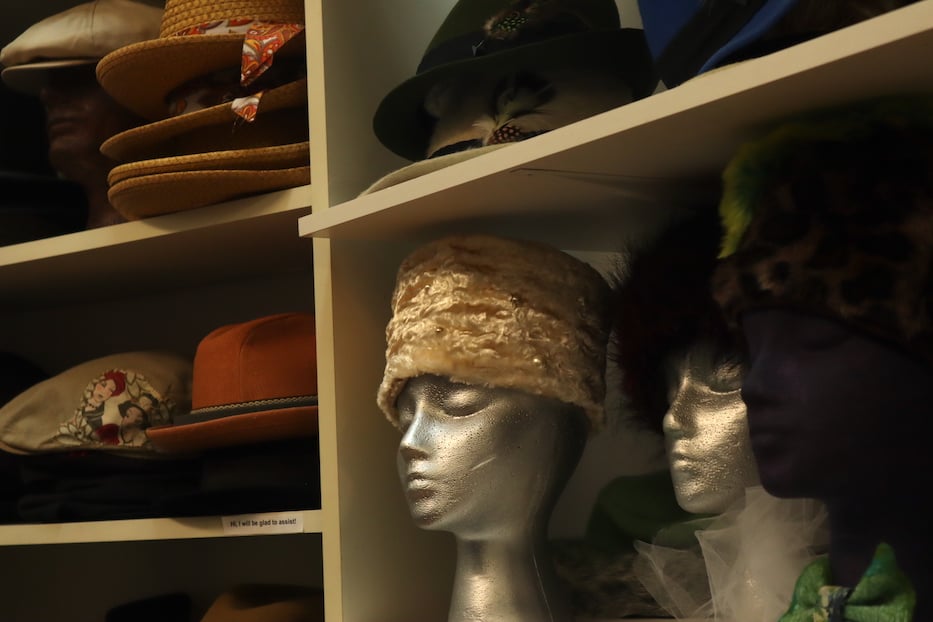
For her, clothing is an opportunity for individuals to express themselves in a unique way; to forget about the difficult parts of life.
“Your clothes,” Cazes-Wiley said, “Are your armor against the world.”
When asked about her design process, she noted that “It’s all in the eye. You see the pattern of old things… and you take what’s old and you try to bring it through the time and make it new.”
Last Friday, Cazes-Wiley showed off a piece called “The New Havener,” a 19th-century style hat made from a French block. The piece, dedicated to the city, is a push against discrimination. Its slogan—“slightly wicked but redeemable”— is meant to reference the objectivity with which its viewers and wearers should see humanity.
Everyone has both good and bad qualities, regardless of their background or lived experience, Cazes-Wiley said. This means no one is above another.
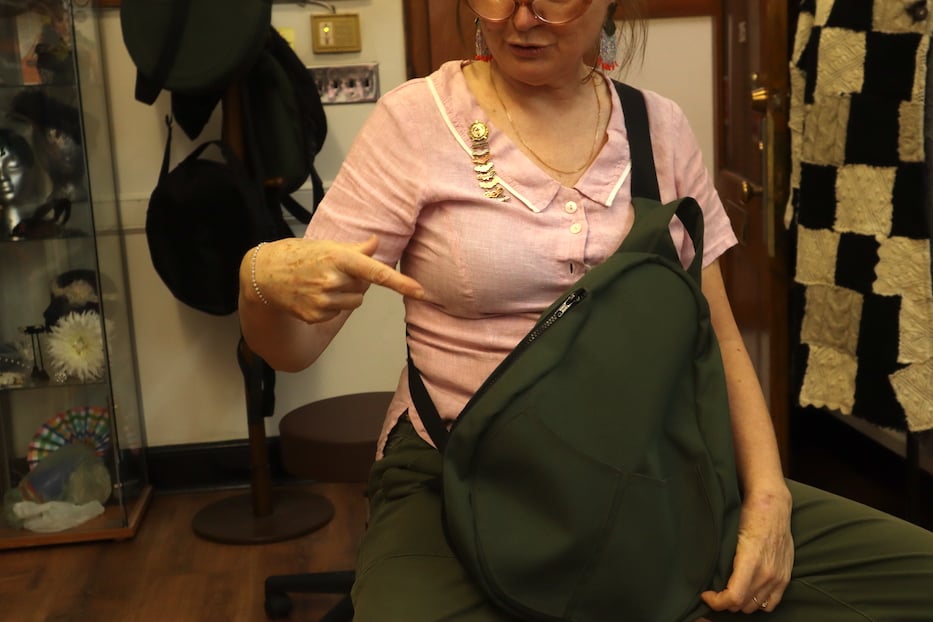
Her most recent designs on the market are the “bootiesitter” and the “safetravel bag.” Cazes-Wiley was inspired to create these designs after enduring 11 back surgeries.
The concept behind both of these designs allows users to live and travel with comfort and convenience. The bootiesitter is a bag that doubles as a plush cushion seat and the safetravel bag is a travel backpack designed to keep belongings secure while on the go.
Both are ergonomic designs that Cazes-Wiley has hand- and machine-sewed herself, and both are designed to alleviate fear and discomfort. She said that the designs can take anywhere from two to five hours, with things like whether the fabric has been pre-cut taken into consideration.
“I don't want to slow down. I want to do what I do. I want to see the world, help the world,” Cazes-Wiley said.
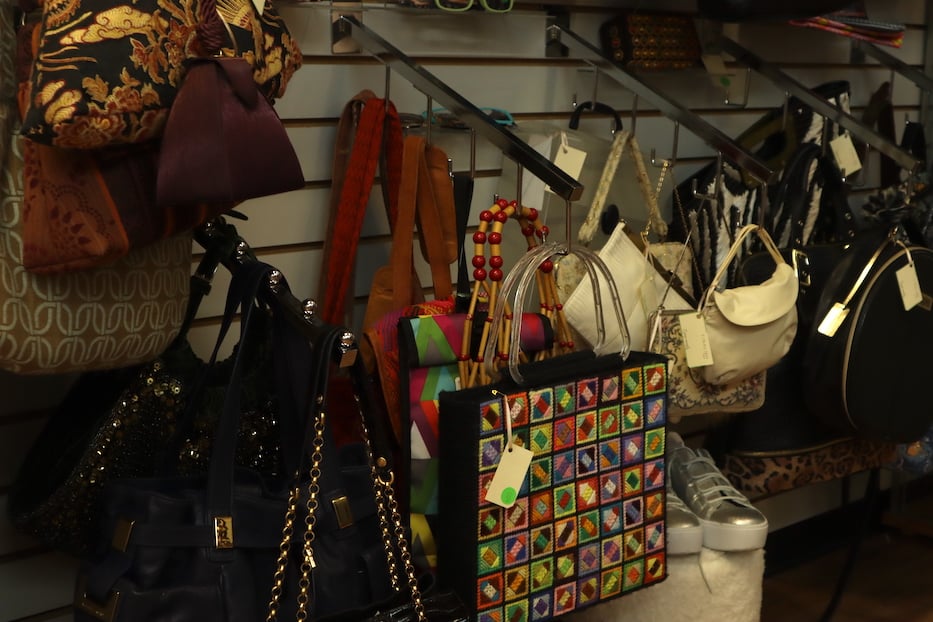
She also revealed an old design, one that she patented with the Rehabilitation Services Administration (RSA) in 2003. The design, which took years to create, is a cow print mini purse with a unique hidden pouch feature. The pouch’s function aligns with the theme of convenience seen in Cazes-Wiley’s more recent designs. She worked tirelessly to ensure that the leather was tanned to her specifications without the use of chemicals, she said.
Despite much of her success, being a niche designer is not easy, she said. Cazes-Wiley recalled how she and many other artisans have been considered “unskilled” because of their lack of an official degree.
“I was angry but I'm not angry anymore. I carved my niche,” she said. Still, she noted that her skills, and those of other artists with niche skills like embroidering, are endangered. As she sees it, the avarice of society makes creating quality difficult.
“People don’t value local and artisanal,” Cazes-Wiley said. “We don’t want to be educated. We wear the greed.”
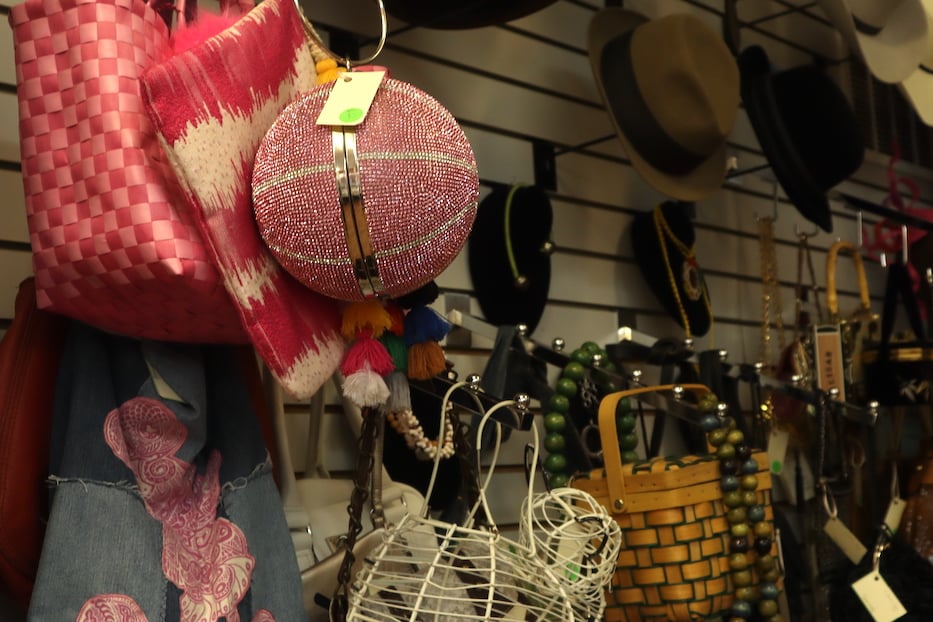
Cazes-Wiley noted how the fashion industry has contributed to extreme problems, including generational deformities in children in countries where chemicals used on leathers are manufactured. She said she hopes that her business, and other artisans like herself, can help alter this reality.
“We create needs, we don’t need,” she noted in regards to consumerist culture.
Cazes-Wiley said she hopes to continue to create what has never been done before. “We haven’t invented anything really. It’s all out there.”
“There’s so much learning in this place of textile, tradition, connection with people…We are from the past and we don’t know where exactly we’re going to be so [my store] brings the whole thing together” Cazes-Wiley said.
Now, Cazes-Wiley says she wants to push forward with her store, with hopes of revamping her website and continuing to sell her latest designs. “I can create big if I am given big”, she noted, in anticipation of opportunities that will come her way as she continues to pursue her passion.
Cazes-Wiley says she has made it this far in her creative and personal journey because of her faith. “God will bring everything that needs to be brought when you are true to who you’re supposed to be,” she said.
Tinaliah Designs & Boutique is currently open Friday 2 to 6 p.m. and Saturday 2 to 7 p.m., and when the sign is visible outside. Sewing classes start at $35, with packages for seven hours of instruction available for $175.

